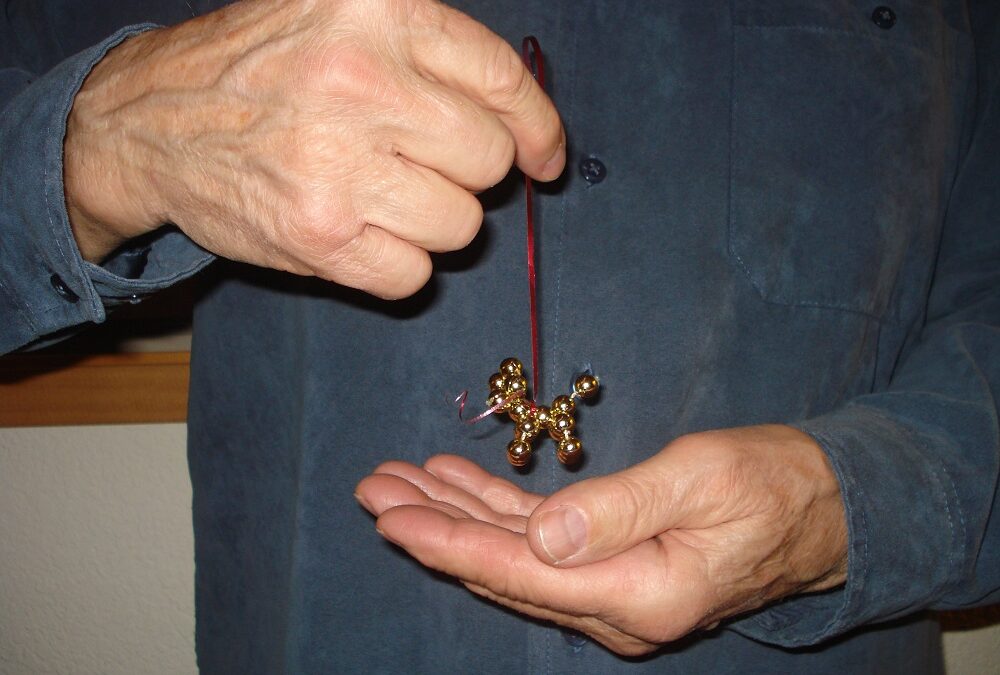The deepest principle of human nature is the craving to be appreciated. (From the Dale Carnegie Course, 1976)
Here’s a new take on compassion and assertiveness! For a stronger Adult, a wiser Wise Parent and a more secure Child, consider the story of “Compassion, Assertiveness and the Pop-Bead Puppy.”
As I sat feeling exhausted in my doctor’s sunny waiting room, an older man holding a string of gold-colored pop-beads came over to me. He said “I want to give you something.” I was touched by his kind, gentle manner and invited him to sit next to me. Before retiring he’d traveled all around Louisiana working for Carpenter Tractors. Gradually he’d discovered that what he loved best to do was “put a smile on a someone’s face.” He said giving tiny pop-bead animals to people was his way to do that and he twisted the golden beads into a puppy for me.
I asked the Bead Man what he did when people got annoyed and treated him like he was trying to do something harmful to them. His face darkened and he said, “That’s bad.” After a moment he added, “but I know He (pointing upward as his face brightened) knows what I’m doing. I shared with him how I’d spent my life trying to find ways to do the same thing. I thanked him and as he left we laughed about how we both “just couldn’t get enough of those wonderful smiles.” This left me to ponder the issue of how humans react to what others offer them.
This gentle man felt really bad when people turned their eyes and hearts away from him as though he were panhandling for loose change. He wanted so much for people to give his gift a chance and could only keep going because he believed that a Higher Power recognized and appreciated him every time. Let’s consider what his motives might have been to perform this unusual behavior. Was he really panhandling for something else that would take from others much more than it gave? We’d call that self-serving and turn away. We could stay open to a friend who did that for a while, but not a stranger. Perhaps we’d fear that if we “gave him an inch, he’d take a mile,” and try to expand the contact into asking, say for a meal or a donation or more listening than we wanted to offer.
The Bead Man told me he just did this to see me smile. Why would he want to do that? He could be one of Elaine Aron’s HSP’s with “sensory processing sensitivity,” whose mirror neurons in their brain get more excited by smiles than the other 80% of the population, so he’d just be sharing what he loves. Chefs, artists, car dealers and most of the rest of us like to do that with others who enjoy the same things. They learn not to take rejection of their gifts as a rejection of themselves and to accept that what they offer may have limited appeal. Finally, he may have found this as a way to somehow transform grief from his life, like the mothers whose children were killed by drunk drivers joined to form MADD, with profoundly rooted zeal and determination to keep fewer children from dying this way.
When someone offers you a gift with an extra urgency that could make you suspicious and turn away, try staying open and allow your Adult to consider thoughtfully where this earnest person is really coming from. Unless there could actually be life-or-death consequences, let your Wise Parent assure your Child that your assertive Adult can set effective limits as needed. Remember that all of us want recognition and appreciation from each other, whatever our styles and the gifts we offer. You may find a kindred spirit along the way to brighten the path of your journey and soothe the pain we all find as we travel.

